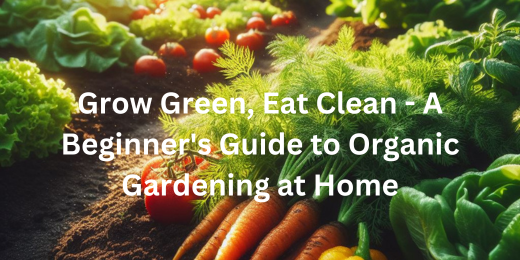
Grow Green, Eat Clean – A Beginner’s Guide to Organic Gardening at Home
Organic gardening for beginners
Introduction to Organic Gardening
Organic gardening for beginners involves growing plants using natural methods without the use of synthetic chemicals or pesticides. By embracing this approach, gardeners can produce homegrown organic fruits, vegetables, and herbs that are healthier and tastier than conventionally grown produce.
The benefits of growing your own organic produce are numerous. Not only does it provide access to fresh and nutritious food, but it also promotes environmental sustainability and reduces exposure to harmful chemicals. Additionally, organic gardening can be a rewarding and therapeutic hobby for individuals of all ages.
Embracing sustainable and eco-friendly practices is essential in organic gardening. By nurturing the soil, conserving water, and encouraging biodiversity, gardeners can create a thriving ecosystem that supports plant growth and overall garden health. Ultimately, organic gardening is not just about cultivating plants; it’s about fostering a deeper connection to nature and promoting wellness for both people and the planet.
Planning Your Organic Garden
When embarking on organic gardening for beginners, it’s crucial to start with thorough planning. Begin by assessing available space and sunlight in your garden area to determine the best location for your plants. Choose crops that are suitable for your region and climate, ensuring they will thrive in your local conditions.
Consider the layout of your garden beds or containers carefully. Optimize space by planning the arrangement of your plants to maximize sunlight exposure and airflow. Utilize techniques such as companion planting to naturally deter pests and promote plant health. By planning thoughtfully, you can create a productive and harmonious organic garden.
In addition to crop selection and layout planning, don’t forget to consider other factors such as soil quality and water access. Invest time in preparing the soil by incorporating organic matter and nutrients to create a healthy growing environment for your plants. Ensure proper drainage to prevent waterlogging and consider installing a rainwater harvesting system for sustainable watering practices. With careful planning and attention to detail, your organic garden will flourish and provide bountiful harvests.
Soil Preparation and Composting
In organic gardening for beginners, nurturing healthy soil is the cornerstone of successful cultivation. Understanding the importance of nutrient-rich soil sets the stage for thriving plants. Through testing soil fertility, gardeners can identify deficiencies and tailor organic amendments like compost to replenish vital nutrients, fostering optimal growing conditions for their crops.
Preparing the soil isn’t just about digging; it’s about making a healthy environment underground. Composting is a sustainable way to lessen waste and improve soil quality. With a composting system for kitchen and garden scraps, gardeners recycle organic material, creating valuable nourishment for their plants.
In the world of home organic gardening, composting is a game-changer. It’s a simple yet powerful way to nurture the soil and promote healthy plant growth. By incorporating compost and organic amendments into the soil, gardeners can cultivate vibrant, thriving gardens while minimising their environmental footprint.
Selecting and Starting Seeds
In the realm of organic gardening for beginners, choosing the right seeds is crucial for a successful harvest. Opt for high-quality organic seeds or seedlings from reputable sources to ensure healthy and vigorous plants. Understand different seed starting techniques such as direct sowing for hardy crops and transplanting for delicate varieties.
Once you have your seeds, it’s essential to provide optimal conditions for germination and growth. Ensure seeds are planted at the correct depth and spacing, and water them regularly to keep the soil moist but not waterlogged. Consider factors like temperature and sunlight requirements to create an environment conducive to seedling development.
Whether you’re starting from seeds or seedlings, nurturing young plants requires patience and attention to detail. By following these home organic gardening tips, beginners can kickstart their gardening journey with confidence, laying the groundwork for a thriving organic garden filled with nutritious and delicious homegrown produce.
Organic Pest and Disease Management
In the world of organic gardening for beginners, understanding common pests and diseases is essential for maintaining healthy plants. South Indian gardens face various challenges, including pests like aphids and diseases like powdery mildew. Implementing natural pest control methods is key, such as planting companion crops to deter pests or introducing beneficial insects for biological control.
Rather than relying on chemical pesticides, home organic gardening tips advocate for organic remedies to manage pest infestations. Neem oil, derived from the neem tree, is a natural insecticide that disrupts pests’ life cycles without harming beneficial insects. Garlic spray, made from crushed garlic cloves and water, acts as a repellent against many garden pests, offering a safe and effective alternative.
By integrating these organic pest control strategies into their gardening practices, beginners can nurture thriving gardens while minimising environmental impact. Embracing natural solutions not only protects plants from harm but also promotes biodiversity and fosters a harmonious balance within the garden ecosystem.
Harvesting and Enjoying Your Homegrown Produce
In the realm of organic gardening for beginners, understanding when and how to harvest crops is essential for reaping the rewards of your hard work. Different crops have varying maturity indicators, such as colour, size, and texture, signalling they are ready for harvest. Harvesting at the peak of ripeness ensures maximum flavour and nutrition in homegrown produce.
Once harvested, surplus produce can be stored and preserved using various techniques, extending its shelf life and reducing food waste. Canning, freezing, and drying are popular home organic gardening tips for preserving fruits and vegetables. These methods lock in freshness and nutritional value, allowing gardeners to enjoy their homegrown bounty throughout the year.
Sharing the fruits of your labour with loved ones is a rewarding aspect of home organic gardening. Whether it’s a basket of freshly picked tomatoes or homemade preserves, sharing homegrown organic food fosters a sense of community and sustainability. For additional advice on organic goods or farming, head to your closest Uyir Organic Farmers Market. Alternatively, you can explore their offerings online by visiting www.uyironline.in or www.uyirorganic.farm.